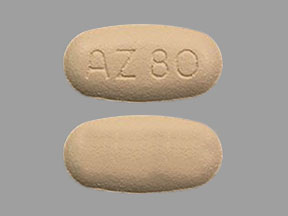Tagrisso Disease Interactions
There are 6 disease interactions with Tagrisso (osimertinib).
- Cardiomyopathy
- Dermatologic toxicities
- Ocular disorders
- Pulmonary toxicity
- QT prolongation
- Renal/liver impairment
EGFR inhibitors (applies to Tagrisso) cardiomyopathy
Major Potential Hazard, Moderate plausibility. Applicable conditions: Ventricular Arrhythmia
Cardiomyopathy was observed in clinical trials of certain EGFR inhibitors. Assess Left Ventricular Ejection Fraction (LVEF) by echocardiogram or multigated acquisition (MUGA) scan before initiation of these agents and then at 3 month intervals while on treatment. Caution is recommended when prescribing these agents to patients with conditions that could impair left ventricular function and it is recommended to withhold treatment with these agents if ejection fraction drops below the established lower limit of normal. For symptomatic congestive heart failure or persistent, asymptomatic LV dysfunction that does not resolve within 4 weeks, permanently discontinue these agents.
EGFR inhibitors (applies to Tagrisso) dermatologic toxicities
Major Potential Hazard, Moderate plausibility. Applicable conditions: Dermatitis - Drug-Induced
Cutaneous reactions, in some cases severe, have been reported with the use of EGFR inhibitors. Monitor patients who develop dermatologic or soft tissue toxicities while receiving these agents for the development of inflammatory or infectious sequelae. It is recommended to withhold treatment, and appropriate measures should be instituted as appropriate or discontinue the use of these agents for dermatologic or soft tissue toxicity associated with severe or life-threatening inflammatory or infectious complications. Advise patients to wear sunscreen and hats and limit sun exposure while receiving therapy with these agents as exposure to sunlight can exacerbate dermatologic toxicities.
EGFR inhibitors (applies to Tagrisso) ocular disorders
Major Potential Hazard, Moderate plausibility. Applicable conditions: Ocular Infection
Some epidermal growth factor receptor (EGFR) inhibitors should be administered cautiously in patients with ocular disorders such as primary keratitis, ulcerative keratitis, or conjunctivitis. It is recommended to interrupt or discontinue treatment with these agents if patients present with acute or worsening ocular disorders.
EGFR inhibitors (applies to Tagrisso) pulmonary toxicity
Major Potential Hazard, Moderate plausibility. Applicable conditions: Pulmonary Impairment, Fever
The use of certain EGFR inhibitors has been associated with pulmonary toxicity. Serious cases of interstitial lung disease (ILD), including fatal cases and interstitial pneumonitis or pulmonary fibrosis have been reported. Caution is recommended when using these agents in patients with a history of interstitial pneumonitis or pulmonary fibrosis or those patients presenting with acute onset of new or progressive unexplained pulmonary symptoms such as dyspnea, cough, and fever pending diagnostic evaluation. If ILD is confirmed, permanently discontinue these agents and institute appropriate measures.
EGFR inhibitors (applies to Tagrisso) QT prolongation
Major Potential Hazard, Moderate plausibility. Applicable conditions: Arrhythmias, Congestive Heart Failure
QT prolongation was observed in patients treated with certain EGFR inhibitors. These agents should be administered with caution in patients with congenital long QTc syndrome, congestive heart failure, electrolyte abnormalities, or those who are taking medications known to prolong the QTc interval. Serum electrolytes should be corrected prior to initiating therapy with these agents. Periodic monitoring of ECGs and electrolytes is recommended in these patients. Permanently discontinue the use of these agents in patients who develop QTc interval prolongation with signs/symptoms of life-threatening arrhythmia.
Osimertinib (applies to Tagrisso) renal/liver impairment
Moderate Potential Hazard, Moderate plausibility. Applicable conditions: Renal Dysfunction, Liver Disease
No formal pharmacokinetic studies of osimertinib have been conducted in patients with renal or hepatic impairment. Based on population pharmacokinetic (PK) analysis of osimertinib, no dose adjustment is recommended in patients with mild (CrCl 60-89 mL/min) or moderate (CrCl 30-59 mL/min) renal impairment, or mild hepatic impairment (total bilirubin <ULN and AST between 1 to 1.5 times the ULN or total bilirubin between 1.0 to 1.5 times ULN and any AST ). There are no data on the pharmacokinetics of osimertinib in patients with severe renal impairment (CrCl less than 30 mL/min) or with moderate to severe hepatic impairment (moderate: total bilirubin between 1.5 to 3.0 times ULN and any AST, and severe: total bilirubin between 3.0-10 times ULN and any AST). Close monitoring is recommended for these patients.
Switch to professional interaction data
Tagrisso drug interactions
There are 631 drug interactions with Tagrisso (osimertinib).
Tagrisso alcohol/food interactions
There is 1 alcohol/food interaction with Tagrisso (osimertinib).
More about Tagrisso (osimertinib)
- Tagrisso consumer information
- Check interactions
- Compare alternatives
- Pricing & coupons
- Reviews (39)
- Drug images
- Side effects
- Dosage information
- During pregnancy
- FDA approval history
- Drug class: EGFR inhibitors
- Breastfeeding
- En español
Related treatment guides
Drug Interaction Classification
| Highly clinically significant. Avoid combinations; the risk of the interaction outweighs the benefit. | |
| Moderately clinically significant. Usually avoid combinations; use it only under special circumstances. | |
| Minimally clinically significant. Minimize risk; assess risk and consider an alternative drug, take steps to circumvent the interaction risk and/or institute a monitoring plan. | |
| No interaction information available. |
See also:
Further information
Always consult your healthcare provider to ensure the information displayed on this page applies to your personal circumstances.


